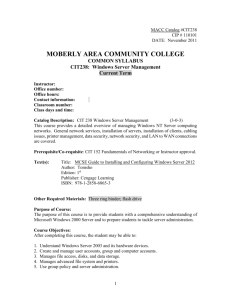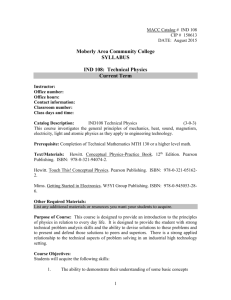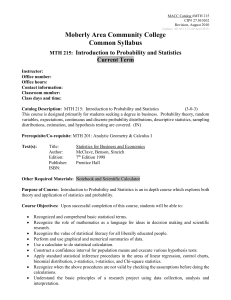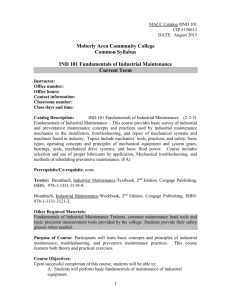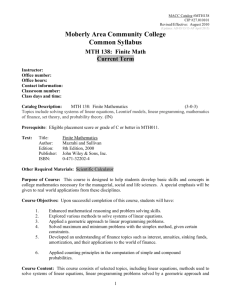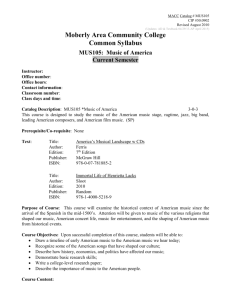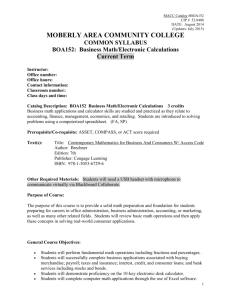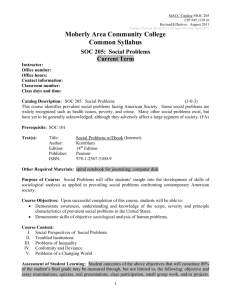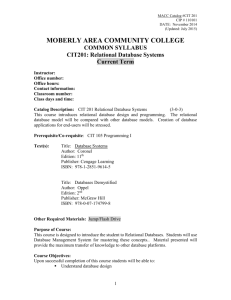PHI 151 Introduction to Logic - Moberly Area Community College
advertisement
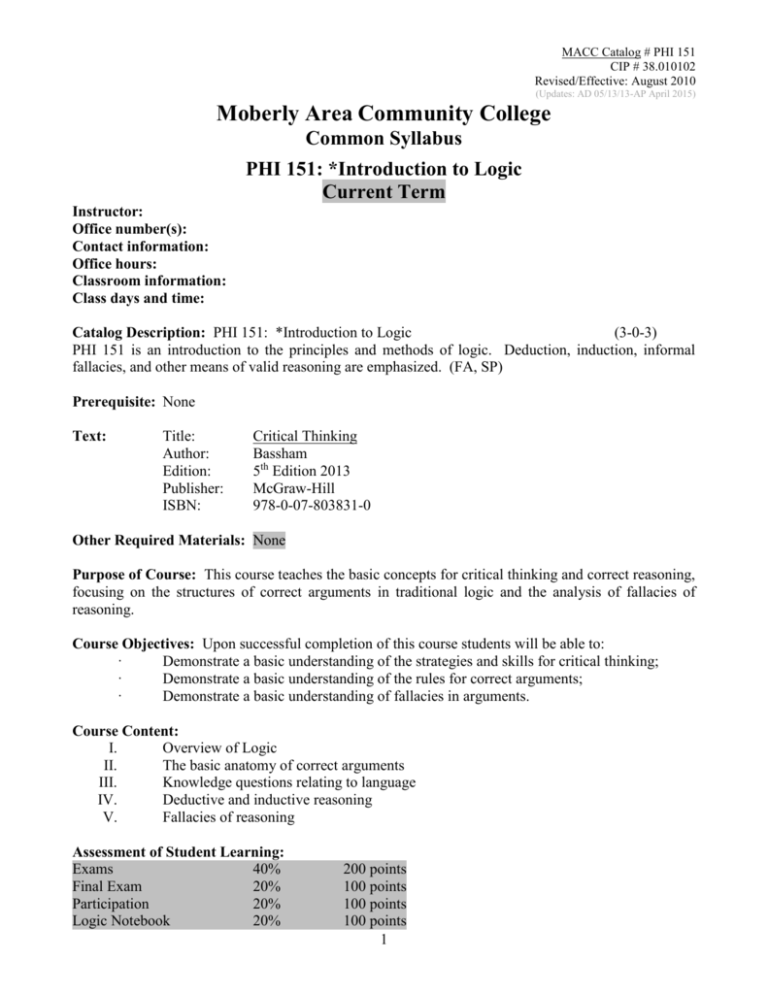
MACC Catalog # PHI 151 CIP # 38.010102 Revised/Effective: August 2010 (Updates: AD 05/13/13-AP April 2015) Moberly Area Community College Common Syllabus PHI 151: *Introduction to Logic Current Term Instructor: Office number(s): Contact information: Office hours: Classroom information: Class days and time: Catalog Description: PHI 151: *Introduction to Logic (3-0-3) PHI 151 is an introduction to the principles and methods of logic. Deduction, induction, informal fallacies, and other means of valid reasoning are emphasized. (FA, SP) Prerequisite: None Text: Title: Author: Edition: Publisher: ISBN: Critical Thinking Bassham 5th Edition 2013 McGraw-Hill 978-0-07-803831-0 Other Required Materials: None Purpose of Course: This course teaches the basic concepts for critical thinking and correct reasoning, focusing on the structures of correct arguments in traditional logic and the analysis of fallacies of reasoning. Course Objectives: Upon successful completion of this course students will be able to: · Demonstrate a basic understanding of the strategies and skills for critical thinking; · Demonstrate a basic understanding of the rules for correct arguments; · Demonstrate a basic understanding of fallacies in arguments. Course Content: I. Overview of Logic II. The basic anatomy of correct arguments III. Knowledge questions relating to language IV. Deductive and inductive reasoning V. Fallacies of reasoning Assessment of Student Learning: Exams 40% Final Exam 20% Participation 20% Logic Notebook 20% 200 points 100 points 100 points 100 points 1 MACC Catalog # PHI 151 CIP # 38.010102 Revised/Effective: August 2010 (Updates: AD 05/13/13-AP April 2015) TOTAL 500 points Exams will consist of objective and essay questions. The Final Exam will be cumulative, closed-book with no aids. Participation will be based on quantity and quality of in-class participation. Attendance and instances of incisive questioning (IQ), demonstration of critical thinking(CT), supportive participation in Socratic Dialogue(SD), sharing of personal views and life-stories which relate to the class material(S) and class-preparedness(CP) will be noted as Excellent(E) Very Good(G) or Poor(P) in the grade sheets. Description of Major Assignment(s)/Projects: Logic Notebook: Students will prepare a notebook which demonstrates their understanding of the more than one-hundred key concepts of Logic. Students may include and label with the key concept being illustrated items such as advertisements, personal statements or experiences, newspaper articles, letters to the editor, extended essays or other material. The Instructor will display and explain samples of notebooks from previous semesters. Statement to Connect Course with General Education Outcomes or Technical Program Outcome Statement: In compliance with MACC’s General Education Outcomes, the student who successfully completes this course will be able to: Demonstrate effective written and oral communication skills o The student will demonstrate effective written and oral communication considering audience and situation through invention, arrangement, drafting, revision and delivery. o The student will construct logical and ethical arguments with evidence to support the conclusions. The student will conform to the rules of Standard English. o The student will analyze, synthesize and evaluate a variety of course material and points of view. o The student will accept academic responsibility for oral/written language re: copyright, plagiarism, and fairness issues. Instructor Policies: Academic Dishonesty: MACC board policy is as follows: “Academic dishonesty by students damages institutional credibility and unfairly jeopardizes honest students; therefore, it will not be tolerated in any form.” Forms of academic dishonesty include but are not limited to the following: violations of copyright law, plagiarism, fabrication, cheating, collusion, and other academic misconduct. Incidents of dishonesty regarding assignments, examinations, classroom/laboratory activities, and/or the submission of misleading or false information to the College will be treated seriously. The procedure for handling academic dishonesty is outlined in the Student Handbook (Policy Handbook M.010). In cases of alleged academic dishonesty, the burden of proof is on the student, not on the instructor. Attendance Policy: Any student who misses two consecutive weeks of class during a regular sixteenweek semester or the equivalent proportion of class time during a shorter session will be dropped from the class by the instructor unless acceptable justification is supplied. An instructor must complete and 2 MACC Catalog # PHI 151 CIP # 38.010102 Revised/Effective: August 2010 (Updates: AD 05/13/13-AP April 2015) file the appropriate forms to drop the student within one week following the student’s violation of the attendance policy. Additionally, any student who misses more than one-fourth of the entire number of in-seat class meetings in a regular 16-week semester or the equivalent proportion of class time during a shorter session, may be dropped from that class by the instructor if, in the opinion of the instructor, the student does not have reasonable opportunity to succeed in the class. A student’s attendance rate will be calculated based upon the first day of the semester (not the student’s date of enrollment in the course.) Student attendance must be defined in a different manner for online, hybrid, and virtual courses. Student attendance in these courses is defined as active participation in the course. Online, hybrid, and virtual courses will, at a minimum, have weekly mechanisms for student participation, such as any or all of the following methods: a. Completion of quizzes or exams b. Submission of assignments c. Participation in threaded discussions d. Communication with the instructor A student who does not participate in an online, hybrid, or virtual course for two consecutive weeks will be dropped by the instructor unless acceptable justification is supplied. An instructor must complete and file the appropriate forms to drop the student within one week following the student’s violation of the attendance policy. As with ground courses, a student’s attendance rate in online courses will also be calculated based upon the first day of the semester. If a student does not demonstrate active participation in the online course within the first two weeks (or the equivalent proportion of class time during a short session), the student will be dropped as “never attended.” Simply logging into an online class does not constitute active participation. Students should be aware that their dropping a course and their last date of attendance in the course may impact their financial aid. (Policy Handbook I.090 and M.095) Tardiness: Per instructor’s policy Make-up and late work: Per instructor’s policy Extra-credit work: Per instructor’s policy Schedule of Student Assignment/Activities: Instructors will identify a Student Assignment/Activities schedule. Instructors have the prerogative to construct the schedule by class periods, weeks, or an overview of topics to be covered. ADA Statement Students who have disabilities that qualify under the Americans with Disabilities Act may register for assistance through the Office of Access and ADA Services. Students are invited to contact the Access Office to confidentially discuss disability information, academic accommodations, appropriate documentation and procedures. For more information, please call either the Moberly office at (660) 263-4100 x 11240 or the Columbia office at (573) 234-1067 x 12120, or visit our web page at http://www.macc.edu/index.php/services/access-office. 3 MACC Catalog # PHI 151 CIP # 38.010102 Revised/Effective: August 2010 (Updates: AD 05/13/13-AP April 2015) . Title IX Statement MACC maintains a strict policy prohibiting sexual misconduct in any form, including sexual harassment, sexual discrimination, and sexual violence. All MACC employees, including faculty members, are considered mandated reporters of sexual misconduct and as such are expected to contact the Title IX Coordinator when they become aware, in conversation or in writing, of an incident of sexual misconduct. For more information on this policy or to learn about support resources, please see http://www.macc.edu/sexual-misconduct-policy or contact Dr. Jackie Fischer, MACC’s Title IX Coordinator, at 660-263-4110, ext. 11236 or jackief@macc.edu. 4



